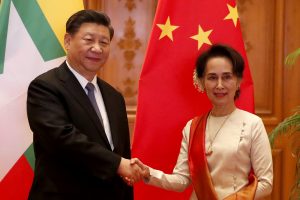Chinese President Xi Jinping arrived in Myanmar’s capital of Naypyidaw on Friday for a two-day state visit, his first international trip of 2020. He hailed the trip as “historic” and vowed to usher the bilateral relationship into a “new era.” The official trip to Myanmar is Xi’s first as president and the first visit by a Chinese president to the Southeast Asia country in 19 years (Xi previously traveled to Myanmar as vice president as part of a four-country Asia tour in 2009 that also included Cambodia, Japan, and South Korea). Xi met with Myanmar President Win Myint, State Counselor Aung San Suu Kyi, and Senior General Min Aung Hlaing, the commander-in-chief of the country’s military forces.
China is Myanmar’s largest trade partner and investor. Imports from China and exports to China accounted for nearly one-third of Myanmar’s merchandise trade in 2018. In 2019, two-way trade totaled 129 billion yuan ($17.7 billion), up more than 28 percent year-on-year. China also invested around $4.8 billion in Myanmar in 2019, up slightly from the $4.7 billion in investments a year earlier.
During his two-day trip, Xi cemented a slew of deals to hasten infrastructure projects along the China-Myanmar Economic Corridor (CMEC), including the finalization of the $1.3 billion deep-sea port at Kyaukphyu in Rakhine state and plans for high-speed rail links and a nearby special economic zone. The CMEC is one of several central components of the Belt and Road Initiative (the China-Pakistan Economic Corridor is another high profile link through South Asia). Within the CMEC are numerous infrastructure projects in various states of completion.
Ahead of his visit, Xi published a letter in Myanmar newspapers in which he championed the 70 years of bilateral relations and characterized the neighborly ties as “pauk-phaw” – translated as “fraternal” or “siblings from the same womb.” The term was coined in the 1950s in the early years of official diplomatic relations between China and Myanmar (then known as Burma). The year 2020 has been designated as the China-Myanmar Year of Culture and Tourism, in a bid to deepen and diversify the scope of relations beyond trade and investment.
Renewing ties between the two neighbors appears to be beneficial for both leaders as Xi Jinping seeks to revitalize projects linking China to the Bay of Bengal under his Belt and Road Initiative and as Aung San Suu Kyi looks to bolster diplomatic ties amid the West’s condemnation and isolation over the treatment of Rohingya, an Muslim ethnic minority in southwestern Rakhine state. (China is also facing its own share of criticism for its detention of Uyghurs, a Muslim and Turkic minority in China’s northwestern region of Xinjiang.) Separately, India is likely to closely watch developments at the Rakhine state port, along with other port projects in Gwadar, Pakistan; Hambantota, Sri Lanka; and Chittagong, Bangladesh as potential gateways to the Indian Ocean Region.
It is notable that Xi’s visit was ceremonial, consisted of high-level exchanges, and did not feature a high-profile visit to specific projects in Myanmar, as a number of them have generated local backlash over displacement and environmental pollution. Nearly 40 local civil society organizations – primarily from Kachin state along the Chinese border — called upon China’s leader in an open letter to permanently suspend a hydropower project, the Myitsone dam. The $3.6 billion Myitsone dam project was first inked in 2009 under Myanmar’s authoritarian government. In 2011 as the country initiated reforms to democratize, the dam was suspended over environmental concerns. Since, the project has failed to get back off the ground due to skirmishes between the Kachin Independence Army, a non-state armed group, and Myanmar armed forces as well as high levels of local unpopularity.
Myanmar’s leading officials may be more publicly embracing refreshed ties with Beijing, but the local population seems to hold a more tepid sentiment. Protesters were denied the right to gather outside the Chinese embassy in Yangon; instead locals gathered before the city hall to demand greater transparency in Chinese projects in country and more benefits to residents.

































